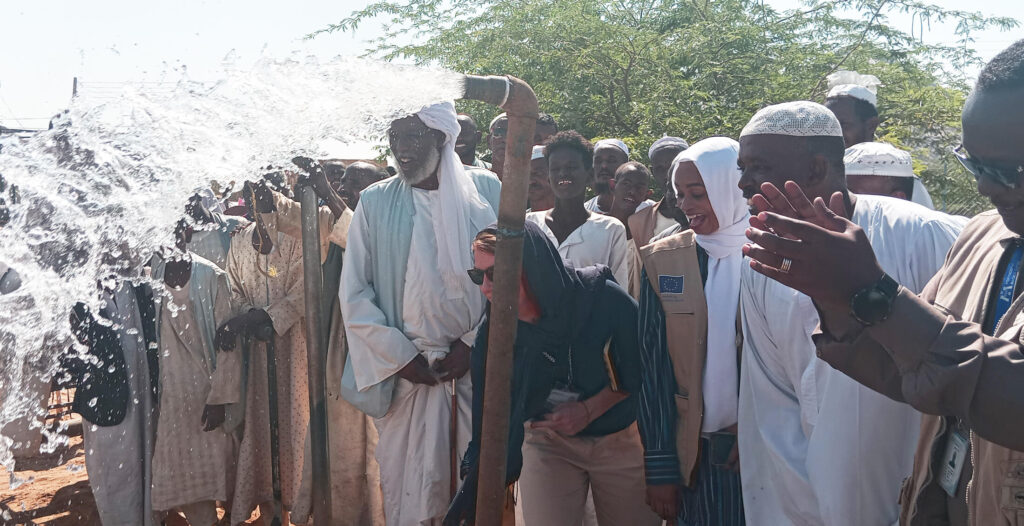The ongoing civil war in Sudan has made access to clean water extremely difficult, especially in areas affected by fighting and displacement. The destruction of infrastructure and restrictions on movement have left many families struggling to secure enough water for daily use.
The water crisis has forced women and children to take on the exhausting task of walking long distances, sometimes through dangerous areas, to fetch water from unsafe sources—increasing the risk of deadly diseases, including diarrhoea and cholera. According to UNICEF, about 17.3 million people in Sudan lack access to safe drinking water.
With generous support from the Sudan Humanitarian Fund, International Medical Corps rehabilitated water supply systems in Gulsa and Zalingei—two villages in Central Darfur—bringing clean water to thousands of people.

Helping Nemat and Her Community
Nemat Ishaq Adam, a mother of three daughters, lives with her children, husband, mother and elderly mother-in-law in a community near Zalingei. She also shares her home with eight siblings, making it a crowded household with significant daily needs.
“We suffered greatly due to the lack of available water, and as the woman responsible for managing the household, I had to walk an hour every day to fetch water. Carrying large containers on my head multiple times daily was exhausting,” Nemat explains. “To meet our family’s needs, I made several trips to collect seven jerry cans of water daily. This left me with little time to care for my children.”
One day, Nemat encountered an International Medical Corps staff member and took the opportunity to explain her community’s water crisis. Our local team assessed the situation and took swift action to rehabilitate the water infrastructure in Zalingei.
They repaired two water tanks—each capable of holding 20,000 litres, enough water to serve 2,600 people daily—and 25 water distribution points. They also installed a water system with a solar-powered pump, and constructed protective fencing to safeguard the water facilities.
“The change was immediate and transformed our lives,” Nemat recalls. “The water station—which had been inactive for more than three years—was restored, providing a continuous water supply for our community.”

International Medical Corps also recruited and trained a 12-member water management committee, which is now led by community leaders. Committee members learned basic operation and maintenance procedures, as well as how to contact Central Darfur state’s Water and Environment Sanitation Agency if more complex issues arise.
“Access to clean water is essential, and seeing its impact on families such as Nemat’s reinforces why we do this work,” emphasizes Arif Osman, WASH Manager with International Medical Corps. “We have made a real difference in the lives of residents in this vulnerable community.”
“Having water readily available has lifted a huge burden off my shoulders,” adds Nemat. “I can now focus on caring for my children without worrying about when and how I will get water.” And her community can move forward with greater stability and hope for the future.
Bringing Clean Water to Gulsa
The rural village of Gulsa is home to about 14,000 people. For years, the community suffered from a severe water shortage due to an outdated diesel-powered pump that frequently broke down, disrupting the water supply and increasing fuel costs. Leaks in the elevated water tank caused wastage and created conditions for mosquito breeding, further exacerbating health risks in the area.
In early 2023, International Medical Corps launched a substantial project to rehabilitate the water point in Gulsa, to provide a sustainable water source for the area’s local population and displaced people.
The first order of business was to replace the inefficient diesel-powered pump with a solar-powered one, significantly reducing operational costs and emissions. The initiative would also eliminate the community’s burden of buying 200 litres of diesel every week to power the generator and paying routine maintenance costs, such as engine-oil changes.

Our team also knew they had to repair the elevated water tank, to prevent leaks and maximise water usage. Finally, they knew they had to foster a sense of ownership among community members to ensure the long-term sustainability of the water station.
As usual, International Medical Corps worked closely with local leaders and community groups to encourage their participation in all project phases. Community members helped clear access roads and clean the surrounding areas, demonstrating that they shared responsibility for maintaining the water supply system.
The project was completed in November 2024, significantly improving the lives of Gulsa community members. Families now have access to a reliable, safe water source, improving hygiene and reducing the incidence of waterborne diseases. Moreover, the community’s collective efforts in maintaining the water station have fostered a spirit of cooperation and resilience.

“With a continuous water supply, we can conveniently wash our clothes and maintain regular bathing, thereby improving our hygiene,” says Shareif Reshay, a community leader in Gulsa.
Learn more about our work in Sudan and our water, sanitation and hygiene (WASH) programmes worldwide, and donate to International Medical Corps today to help people around the world affected by conflict, disaster and disease.
